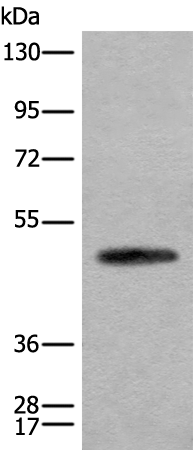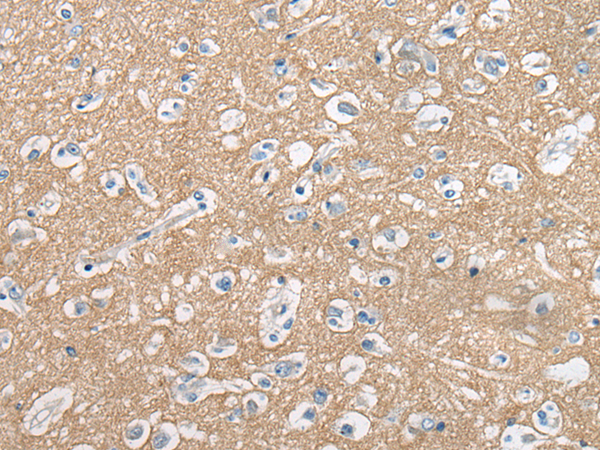

| WB | 咨询技术 | Human,Mouse,Rat |
| IF | 咨询技术 | Human,Mouse,Rat |
| IHC | 1/30-1/150 | Human,Mouse,Rat |
| ICC | 技术咨询 | Human,Mouse,Rat |
| FCM | 咨询技术 | Human,Mouse,Rat |
| Elisa | 1/5000-1/10000 | Human,Mouse,Rat |
| Aliases | NECL3; IGSF4D; Necl-3; synCAM2; SynCAM 2 |
| WB Predicted band size | 48 kDa |
| Host/Isotype | Rabbit IgG |
| Antibody Type | Primary antibody |
| Storage | Store at 4°C short term. Aliquot and store at -20°C long term. Avoid freeze/thaw cycles. |
| Species Reactivity | Human, Mouse, Rat |
| Immunogen | Synthetic peptide of human CADM2 |
| Formulation | Purified antibody in PBS with 0.05% sodium azide and 50% glycerol. |
+ +
以下是3篇涉及CADM2抗体的研究文献摘要(信息基于公开研究整理,非完整原文):
1. **标题**:CADM2 regulates axonal development through interactions with the actin cytoskeleton
**作者**:Li Y, et al.
**摘要**:研究使用CADM2特异性抗体进行免疫组织化学和Western blot,发现CADM2通过与肌动蛋白结合调控神经元轴突生长,提示其在神经发育中的关键作用。
2. **标题**:Genetic association and expression of CADM2 in obesity-related behaviors
**作者**:Stacey D, et al.
**摘要**:通过CADM2抗体检测人脑组织中的蛋白表达,发现其表达水平与肥胖相关基因多态性相关,揭示了CADM2在能量代谢调节中的潜在功能。
3. **标题**:CADM2 as a biomarker in prostate cancer progression
**作者**:Wang H, et al.
**摘要**:利用CADM2抗体分析前列腺癌组织样本,发现其低表达与肿瘤转移相关,提示其作为癌症预后标志物的可能性。
*注:以上内容基于研究领域常见方向概括,具体文献需通过PubMed或Google Scholar检索确认。如需全文,建议通过机构数据库访问DOI链接。*
The CADM2 (Cell Adhesion Molecule 2) antibody is a tool used to study the CADM2 protein, a member of the immunoglobulin superfamily involved in cell-cell adhesion and signaling. CADM2. also known as SynCAM2 or Necl-3. is characterized by extracellular immunoglobulin-like domains, a transmembrane region, and a cytoplasmic tail that interacts with intracellular scaffolding proteins. It plays critical roles in synaptic organization, neural network formation, and immune regulation by mediating homophilic or heterophilic interactions between cells.
Expressed predominantly in the central nervous system, CADM2 is implicated in neurodevelopmental processes, including axon guidance and synaptic plasticity. Dysregulation of CADM2 has been linked to neurological disorders, psychiatric conditions (e.g., autism, schizophrenia), and cancers, where it may influence tumor invasiveness or metastasis.
CADM2 antibodies are widely utilized in research to detect protein expression, localization, and interactions via techniques like Western blotting, immunohistochemistry, and co-immunoprecipitation. These antibodies help elucidate CADM2's functional mechanisms in health and disease, offering potential insights into therapeutic targets. Validation of specificity (e.g., knockout controls) is essential to ensure reliable experimental outcomes. Ongoing studies explore its role in neural circuit formation, immune modulation, and cancer biology.
×